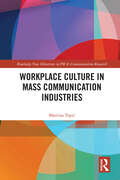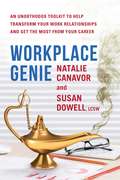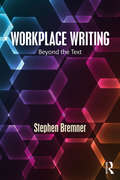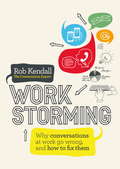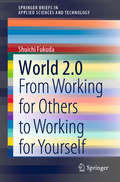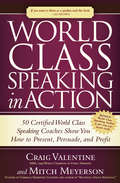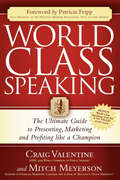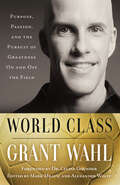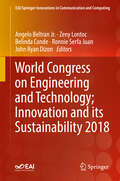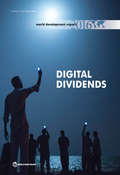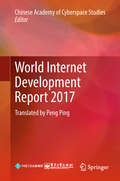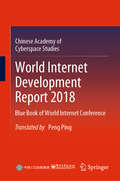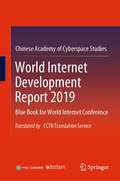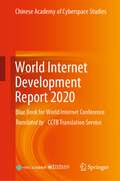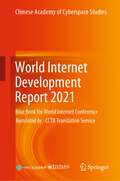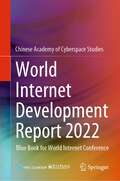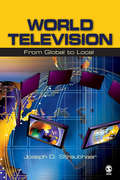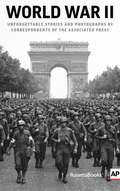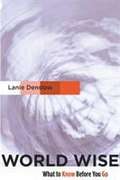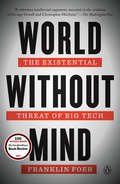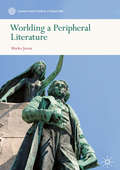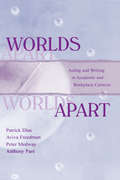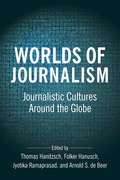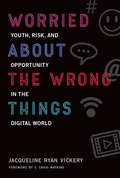- Table View
- List View
Workplace Culture in Mass Communication Industries (Routledge New Directions in PR & Communication Research)
by Martina TopićAcross communication industries, women face barriers and a catch 22 at all organisational levels and suffer from cultural masculinities. Offering a systematic overview of women’s lived experiences, this book discusses major issues in contemporary communication industries, including public relations, journalism and advertising, to understand the barriers that still exist. With a particular focus on office culture, the book concentrates on analysing the position and experiences of women working across communication industries and uses the theoretical framework of cultural masculinities to explore whether women’s organisational experiences and the lack of opportunities span across sectors. The author explores how cultural masculinities as well as discrimination, sexism and harassment can work against women’s interests and impede their career progression. The chapters provide a quality overview of existing theories as well as new insights to demonstrate how organisations operate and function in a way that systematically disadvantages women. The book will be a valuable resource for academics and researchers in the fields of organisational studies, public relations, advertising and journalism, as well as postgraduate and doctoral students in these areas. The interdisciplinary nature will also appeal to those across gender and labour studies, and human resource management.
Workplace Genie: An Unorthodox Toolkit to Help Transform Your Work Relationships and Get the Most from Your Career
by Natalie Canavor Susan DowellFrom time to time, many of us might wish for a genie to transform our workplace. But what if you yourself had that power? Workplace Genie shows employees, entrepreneurs, and virtual workers how to handle challenging work relationships in unorthodox ways. Melding the proven ideas of a communications expert and leading psychotherapist, this book gives readers a powerful new toolbox to connect with their own inner resources and understand other people’s perspectives.Readers will learn how to move past their own self-imposed obstacles, assess situations more realistically, and build positive long-term relationships. This book is an essential resource for those who want to take the initiative with confidence and: Improve their own work environment by bringing out the best in other people Reset relationships and overcome previous experiences that hamper success Relate to their boss and coworkers better Keep their cool when triggered by old insecuritiesArmed with this essential toolkit, you will become your own workplace genie.
Workplace Writing: Beyond the Text
by Stephen BremnerWorkplace Writing: Beyond the Text draws together a wealth of research into different aspects of writing in workplace settings, creating a comprehensive picture of workplace writing and covering factors and activities that go far beyond the text. In a full analysis of the challenges facing the student writer transitioning from the academy to the workplace, this book: covers topics ranging from intertextuality and collaborative writing practices to considerations of power and politeness, and the impact of organisational culture and processes of socialisation brings together the multiple, often interlinked factors that surround and impact on the process of workplace writing and the texts produced in professional settings takes a close look at the pedagogical implications of the various issues relating to workplace writing serves as a resource for teachers who want to go beyond potentially simplistic accounts of writing in the workplace and to provide students with a richer picture of what happens there Workplace Writing will be essential reading for any students, pre- and in-service teachers and researchers with an interest in professional and business discourse and language teaching for specific purposes.
Workstorming
by Rob KendallWhatever your job you need to communicate with others, as even when your intentions are sound, the impact of a bad conversation can be highly destructive. If people in your work community form a negative opinion of you, they stop properly listening. Rob explains how and why your career success can depend so much on good communication at work. Each chapter is short and self-contained, focusing on a specific topic with clear steps for action and a key lesson. As in Blamestorming, there is a cast of characters placed in a variety of situations in which they experience conversations go wrong. Using five simple 'warning signs' to watch out for Rob explains how the characters could change the way they speak and listen in order to achieve a positive outcome.
World 2.0: From Working for Others to Working for Yourself (SpringerBriefs in Applied Sciences and Technology)
by Shuichi FukudaThis book explores on how the Internet of Things (IoT) will change society by bringing living and non-living things together. The IoT is currently attracting considerable attention, but most of the discussions focus on engineering aspects alone. The IoT, however, is not an extension of traditional engineering, where humans and machines are separated. Instead it connects humans and machines, enabling them to work together as a team: the IoT Connected Society.In traditional engineering, our knowledge and experience of physical and non-living things plays a key role, but such knowledge and experience alone are not enough. We need to introduce life science approaches and integrate them into physical science to really develop the IoT connected society.In addition, the Internet is not only a tool for delivering messages: it is a broader communication tool. In the IoT connected society, living things and non-living things communicate in complex ways. Machines 1. Introduction2. Emerging Industrial Revolution3. IoT: What makes it different from the past revolutions4. World is changing5. Engineering: How It was developed so far6. Humans: Their characteristics7. Value is changing8. Adaptive team organization and management9. Integration of Physical Science and Life Science10. Summary can provide humans with a improved situational awareness and advice, and together they can communicate to develop a better, happier society. Thus, this book makes the case that to make the IoT connected society a reality, we need to integrate the physical and life sciences and develop a new science for the next generation of engineering.
World Class Speaking in Action: 50 Certified World Class Speaking Coaches Show You How to Present, Persuade, and Profit
by Mitch Meyerson Craig ValentineThe definitive guide to powerful presentations: &“If you want to thrive as a speaker, read this book&” (Les Brown). How do you keep your audience on the edge of their seats and turn your presentations into profits? Here, dozens of industry professionals provide real-life examples and case studies on how to . . . * Craft an unforgettable message that hits home * Deliver your speech in a way that keeps your audience engaged * Sell your message so your audience members take the exact next step you want them to take * Master leading-edge digital technologies and speak to thousands World Class Speaking in Action covers both the art and the business of public speaking—a one-stop shop for building breakthrough presentations and turning them into bundles of profits.
World Class Speaking: The Ultimate Guide to Presenting, Marketing and Profiting Like a Champion
by Mitch Meyerson Craig ValentineWhen World Class Speaker meets World Class Guerrilla Marketer, your profits explode! How would you like to become a World Class Speaker others travel far & wide to see? How would you like to turn your presentations into profit-making machines that bring in 6 figures or more each year? How would you like to speak to audiences without having to leave home? World Class Speaking is the system for you! Many books cover the art of public speaking while others cover the business side. Finally there is a book that covers both! With World Class Speaking you will learn how to build stellar presentations that keep your audiences on the edge of their seats, turn your presentations into dozens of profitable income streams, master leading-edge technologies & speak to 1000 without even leaving home, and automate your business & make passive recurring income while you sleep. World Class Speaking is the one-stop-shop for building breakthrough presentations & turning them into a solid system of ongoing income.
World Class: Purpose, Passion, and the Pursuit of Greatness On and Off the Field
by Grant Wahl&“This collection of Grant&’s work is a great testament to not only what he did when he was here, but what he&’s still doing to impact others.&”—LeBron James The definitive collection of beloved late journalist Grant Wahl&’s work—a masterclass in the art of sportswritingAfter Grant Wahl died of an aortic aneurysm at the 2022 FIFA World Cup in Qatar, collapsing in his press seat during a quarterfinal match, tributes to Wahl poured in from around the globe. Wahl was beloved for good reason—he was kind, generous, and unflinching in the face of injustice. He was also one of the best sports journalists of his generation.Spanning four decades of storytelling, World Class collects for the first time the finest writing of Grant Wahl, from op-eds for his college newspaper to twenty-five years of reporting at Sports Illustrated to his deeply personal work for Fútbol with Grant Wahl on Substack. Wahl was the multi-tool modern sportswriter: clear and direct; able to write long, short, or in between; cosmopolitan; socially aware.Arranged thematically, World Class demonstrates how Wahl&’s career aligned with the evolution of sportswriting. Included are explorations of soccer subcultures from Buenos Aires and F.C. Barcelona to the dusty sandlots of Nacogdoches, Texas, as well as accounts of trophy lifts that have a first-draft-of-history definitiveness. Some pieces capture prodigies early in their careers, like LeBron James and Landon Donovan; others lift the voices of the women athletes to whom Wahl paid early attention—stars like Abby Wambach and Megan Rapinoe. The book showcases the daring and important positions Wahl took in Qatar in the weeks before he died, supporting migrant workers and LGBTQ+ people.More than a collection of Grant Wahl's best work, World Class is a portrait of a journalist at the height of his powers, always evolving with the times, revealed by the stories he found and the unflinching way he told them.
World Congress on Engineering and Technology; Innovation and its Sustainability 2018 (EAI/Springer Innovations in Communication and Computing)
by Angelo Beltran Jr. Zeny Lontoc Belinda Conde Ronnie Serfa Juan John Ryan DizonThe book presents the proceedings of the World Congress on Engineering and Technology, Innovation and its Sustainability (WCETIS 2018), which took place on November 28-29, 2018 in Manila, Philippines. The conference featured the following tracks: Industrial Engineering and Healthcare, Sustainable Infrastructure; Water Resources Planning and Management; Heat transfer and fluids; Electronics and Electrical Engineering; and Internet of Things. Papers stem from academia and industry throughout the world, showing a variety of perspectives.Presents the proceedings of the World Congress on Engineering and Technology, Innovation and its Sustainability (WCETIS 2018), November 28-29, 2018 in Manila, PhilippinesShows how engineering and technology serve to support a variety for industries from manufacturing to water resourcesFeatures papers from a variety of researchers and developers from around the world
World Development Report 2016
by World Bank GroupDigital technologies are spreading rapidly, but digital dividends--the broader benefits of faster growth, more jobs, and better services--are not. If more than 40 percent of adults in East Africa pay their utility bills using a mobile phone, why can't others around the world do the same? If 8 million entrepreneurs in China--one third of them women--can use an e-commerce platform to export goods to 120 countries, why can't entrepreneurs elsewhere achieve the same global reach? And if India can provide unique digital identification to 1 billion people in five years, and thereby reduce corruption by billions of dollars, why can't other countries replicate its success? Indeed, what's holding back countries from realizing the profound and transformational effects that digital technologies are supposed to deliver? Two main reasons. First, nearly 60 percent of the world's population are still offline and can't participate in the digital economy in any meaningful way. Second, and more important, the benefits of digital technologies can be offset by growing risks. Startups can disrupt incumbents, but not when vested interests and regulatory uncertainty obstruct competition and the entry of new firms. Employment opportunities may be greater, but not when the labor market is polarized. The internet can be a platform for universal empowerment, but not when it becomes a tool for state control and elite capture. The World Development Report 2016 shows that while the digital revolution has forged ahead, its "analog complements ?--the regulations that promote entry and competition, the skills that enable workers to access and then leverage the new economy, and the institutions that are accountable to citizens--have not kept pace. And when these analog complements to digital investments are absent, the development impact can be disappointing. What, then, should countries do? They should formulate digital development strategies that are much broader than current information and communication technology (ICT) strategies. They should create a policy and institutional environment for technology that fosters the greatest benefits. In short, they need to build a strong analog foundation to deliver digital dividends to everyone, everywhere.
World Englishes in English Language Teaching
by Alex BarattaThis book provides an in-depth exploration of World Englishes and their place in the English as a Foreign Language (EFL) classroom. It opens with a critical assessment of the research to date that includes analysis of competing and complementary terms such as English as an International Language (EIL), Global English, English as a Lingua Franca (ELF) and 'Glocal English'. Here, and throughout the work, the author problematizes the terminologies used to define and describe Englishes, arguing for example for the need to distinguish between Chinglish and China English. The book then turns to an examination of three case study varieties of non-inner circle English: Konglish, Singlish and Indian English; before exploring the results of an original empirical study into language attitudes concerning several varieties of English among language teachers and learners. Finally, sample exercises for the classroom are provided. This book will be of particular interest to language teachers and teacher trainers, and to students and scholars of EFL and applied linguistics more broadly.
World Internet Development Report 2017: Translated by Peng Ping
by Chinese Academy of Cyberspace StudiesAn important outcome of the Fourth World Internet Conference, this book provides a comprehensive account of the status quo and trends in global Internet development. Covering network infrastructure, information technology, digital economy, e-governance, cyber security, and international cyberspace governance, it presents the Global Internet Development Index System to assess the Internet development of various major countries and emerging economies.
World Internet Development Report 2018: Blue Book of World Internet Conference
by Chinese Academy of Cyberspace StudiesThis book is an important outcome of the Fifth World Internet Conference. It provides a comprehensive account of the new trends and highlights of global Internet development over the past year, covering network infrastructure, information technology, digital economy, world internet media, cyber security, and international cyberspace governance. This year, the book improves the Global Internet Development Index System and adds more countries into the assessed list, in order to reflect more comprehensively, objectively and accurately the general situation of the world Internet development and thus to provide reference for all countries in promoting Internet development and governance.
World Internet Development Report 2019: Blue Book for World Internet Conference, Translated by CCTB Translation Service
by Chinese Academy of Cyberspace StudiesThis book systematically reviews world Internet development over the past 50 years, and comprehensively discusses the great contributions it has made to economic and social advances. Further, it describes the development, status and trends related to the Internet in major countries around the globe in 2019, and provides an in-depth analysis of the latest conditions, dynamics and development trends in key areas, including information infrastructure, information technology, digital economy, digital government, Internet media, cyberspace security, and international cyberspace governance. Moreover, the book further modifies and enhances the Global Internet Development Index System, in order to better show the Internet development strengths and advantages in various countries, and to reflect the global development trends more comprehensively, accurately and objectively. This book reviews the significant developments and summarizes the lessons learned as well as the future challenges. From a global perspective, it offers a vision of building a community with a shared future in cyberspace based on the new concepts, new ideas and new achievements of various countries participating in cyberspace development and construction. As such it is a valuable reference resource for anyone working in Internet related fields, such as those in government departments, internet enterprises, scientific research institutions, colleges and universities wanting to fully understand world Internet development.
World Internet Development Report 2020: Blue Book for World Internet Conference
by Chinese Academy of Cyberspace StudiesThis book systematically reviews the development process of the world Internet and comprehensively reveals the great contributions of the Internet to economic development and social progress. The world today is marked by changes unseen in a century, and Internet development is facing new opportunities and challenges. In 2020, the COVID-19 epidemic broke out and spread at the global scale, which enormously impacted the global economy and society. Internet played an increasingly important role.Meanwhile, based on the development status of the global Internet, this book fully reflects the development process, status and trend of the world Internet in 2020, systematically summarizes the development status and highlights of the Internet in the major countries around the world, and makes an in-depth analysis of the new conditions, new dynamics and new trends of the development in the key Internet fields; the contents cover the information infrastructure, information technology, digital economy, digital government, internet media, network security, and international cyberspace governance, and other aspects. Moreover, this book further adjusts and enriches the development index systems of the world Internet, in the hope of better showing the development strength and development advantages of the Internet in various countries, and reflecting the overall development trend of the world Internet more comprehensively, accurately and objectively.From an objective perspective, this book collects the latest research results in the global internet field, featuring comprehensive contents and highlights; from a historical perspective, this book reviews the significant development process of the global internet, summarizes the experience and faces the future; from a global perspective, this book tries to construct the cyberspace community with a common future based on the new concepts, new ideas and new achievements of various countries in participating in cyberspace development and construction. This book provides an important reference value for employees in Internet fields, such as government departments, Internet enterprises, scientific research institutions, colleges and universities, to fully understand and master the development of the world internet.
World Internet Development Report 2021: Blue Book for World Internet Conference
by Publishing House of Electronics IndustryThis book objectively represents the status quo and trends of world Internet development in 2021, systematically summarizes Internet development in major countries and regions, and deeply analyzes new development condition and trends in key fields of Internet, in terms of eight aspects, i.e., information infrastructure, information technology, digital economy, e-government, cyber media, cybersecurity, cyber laws, and international cyberspace governance. This book maintains the index system of world Internet development, optimizes some indexes, and comprehensively evaluates Internet development in major countries and regions in the world, in order to better demonstrate the strength and characteristics of Internet development in various countries and mirror the overall trend in world Internet development in a comprehensive, accurate, and objective way.This book collects the latest research results in world Internet development. With diverse subjects and detailed discussion, this book possesses great significance for these engaged in Internet field in governmental departments, Internet enterprises, scientific research institutions, and universities, who hope to fully understand world Internet development.
World Internet Development Report 2022: Blue Book for World Internet Conference
by Publishing House of Electronics IndustryThis book objectively presents the status quo and trends of world Internet development in 2022, systematically summarises Internet development in major countries and regions, and deeply analyses new development conditions and trends in key areas of the Internet in terms of eight aspects, i.e. information infrastructure, information technology, digital economy, e-government, cybermedia, cybersecurity, cyberlaw and international cyberspace governance. This book maintains the index system of world Internet development, optimises some indexes, and comprehensively evaluates Internet development in major countries and regions of the world, in order to better show the strength and characteristics of Internet development in various countries and reflect the overall trend of world Internet development in a comprehensive, accurate and objective way.This book collects the latest research results on the world Internet development. With diverse topics and in-depth discussions, this book is of great significance to those involved in the Internet field in government departments, Internet companies, scientific research institutions and universities who hope to fully understand the world's Internet development.
World Television: From Global to Local
by Joseph D. StraubhaarWorld Television: From Global to Local, a new assessment of the interdependence of television across cultures and nations brings together the most current research and theories on the subject. By examining recent developments in the world system of television as well as several theories of culture, industry, genre, and audience, author Joseph D. Straubhaar offers new insights into the topic. He argues that television is being simultaneously globalized, regionalized, nationalized, and even localized, with audiences engaging it at multiple levels of identity and interest; therefore the book looks at all these levels of operation.Key FeaturesDraws upon both international communication and cultural studies perspectives: Presents a new model is presented that attempts to move beyond the current controversies about imperialism and globalization.Looks at historical patterns: Historical patterns across cultures and countries help compare where television has been and where it is going.Takes a contemporary focus: Uses of technology, flows and patterns of program development, genres of television, the interaction of producers and audiences, and patterns of audience choice among emerging alternatives are examined. Explores how the audience for these evolving forms of television is structured: The effects of these forces or patterns of television have on both cultural formations and individual identities are identified.Intended AudienceThis is an excellent text for advanced undergraduate and graduate courses in Globalizatiion and Culture, Global Media, Television Studies, Television Criticism, and International Media.
World War II: Unforgettable Stories and Photos by Correspondents of The Associated Press
by The Associated PressPowerful, visceral, and essential to preserving and understanding our past, the work of Associated Press photographers and journalists lives on through the pages of World War II.Never before in history had the day-to-day struggles and victories of war—from the home front to the front lines—been chronicled in such graphic and unflagging detail as during the Second World War. Nearly 200 photographers and reporters of Associated Press volunteered to cover the war across the globe from 1939 through 1945. The heroic achievements of these reporters and photographers—some of whom gave their lives—are remembered through the stunning photographs and moving firsthand reports of World War II: Unforgettable Stories and Photographs by Correspondents of The Associated Press.World War II commemorates the experiences of the individuals who brought the war into the homes of millions of Americans. Originally published in 1945 as Reporting to Remember: Unforgettable Stories and Pictures of the War by Associated Press Correspondents, this updated anniversary edition includes a new interview with former AP World War II correspondent George Bria, as well as a new Foreword by current AP Vice President for International News John Daniszewski.
World Wise: What to Know Before You Go
by Lanie DenslowWorld Wise covers topics ranging from general etiquette to business philosophies in specific regions of the world. It is suitable both for the seasoned professional involved in international business, hoping to sharpen skills, and the newcomer to the global business scene. Denslow seeks to help the reader overcome common cultural misunderstandings and establish effective working relationships around the world.
World Without Mind: The Existential Threat of Big Tech
by Franklin FoerFranklin Foer reveals the existential threat posed by big tech, and in his brilliant polemic gives us the toolkit to fight their pervasive influence. Over the past few decades there has been a revolution in terms of who controls knowledge and information. This rapid change has imperiled the way we think. Without pausing to consider the cost, the world has rushed to embrace the products and services of four titanic corporations. We shop with Amazon; socialize on Facebook; turn to Apple for entertainment; and rely on Google for information. These firms sell their efficiency and purport to make the world a better place, but what they have done instead is to enable an intoxicating level of daily convenience. As these companies have expanded, marketing themselves as champions of individuality and pluralism, their algorithms have pressed us into conformity and laid waste to privacy. They have produced an unstable and narrow culture of misinformation, and put us on a path to a world without private contemplation, autonomous thought, or solitary introspection—a world without mind. In order to restore our inner lives, we must avoid being coopted by these gigantic companies, and understand the ideas that underpin their success. Elegantly tracing the intellectual history of computer science—from Descartes and the enlightenment to Alan Turing to Stuart Brand and the hippie origins of today's Silicon Valley—Foer exposes the dark underpinnings of our most idealistic dreams for technology. The corporate ambitions of Google, Facebook, Apple, and Amazon, he argues, are trampling longstanding liberal values, especially intellectual property and privacy. This is a nascent stage in the total automation and homogenization of social, political, and intellectual life. By reclaiming our private authority over how we intellectually engage with the world, we have the power to stem the tide. At stake is nothing less than who we are, and what we will become. There have been monopolists in the past but today's corporate giants have far more nefarious aims. They’re monopolists who want access to every facet of our identities and influence over every corner of our decision-making. Until now few have grasped the sheer scale of the threat. Foer explains not just the looming existential crisis but the imperative of resistance.
Worlding a Peripheral Literature (Canon and World Literature)
by Marko JuvanBringing together the analyses of the literary world-system, translation studies, and the research of European cultural nationalism, this book contests the view that texts can be attributed global importance irrespective of their origin, language, and position in the international book market. Focusing on Slovenian literature, almost unknown to world literature studies, this book addresses world literature’s canonical function in the nineteenth-century process of establishing European letters as national literatures. Aware of their dependence on imperial powers, (semi)peripheral national movements sought international recognition through, among other things, the newly invented figure of the national poet. Writers central to dependent national communities were canonized to represent their respective cultures to the norm-giving Other – the emerging world literary canon and its aesthetic ideology. Hence, national literatures asserted their linguo-cultural individuality through the process of worlding; that is, by their positioning in the international literary world informed by the supposed universality of the aesthetic.
Worlds Apart: Acting and Writing in Academic and Workplace Contexts (Rhetoric, Knowledge, and Society Series)
by Peter Medway Aviva Freedman Patrick Dias Anthony ParWorlds Apart: Acting and Writing in Academic and Workplace Contexts offers a unique examination of writing as it is applied and used in academic and workplace settings. Based on a 7-year multi-site comparative study of writing in different university courses and matched workplaces, this volume presents new perspectives on how writing functions within the activities of various disciplines: law and public administration courses and government institutions; management courses and financial institutions; social-work courses and social-work agencies; and architecture courses and architecture practice. Using detailed ethnography, the authors make comparisons between the two types of settings through an understanding of how writing is operative within the particularities of these settings. Although the research was initially established to further understanding of the relationships between writing in academic and workplace settings, it has evolved to examining writing as it is embedded in both types of settings--where social relationships, available tools, and historical, cultural, temporal, and physical location are all implicated in complex ways in the decisions people make as writers. Readers of this volume will discover that the uniqueness of each setting makes salient different aspects of writers and writing, resulting in complex, and potentially unsettling implications for writing theory and the teaching of writing.
Worlds of Journalism: Journalistic Cultures Around the Globe (Reuters Institute Global Journalism Series)
by Folker Hanusch Thomas Hanitzsch Jyotika Ramaprasad Arnold S. de BeerHow do journalists around the world view their roles and responsibilities in society? Based on a landmark study that has collected data from more than 27,500 journalists in 67 countries, Worlds of Journalism offers a groundbreaking analysis of the different ways journalists perceive their duties, their relationship to society and government, and the nature and meaning of their work.Challenging assumptions of a universal definition or concept of journalism, the book maps a world populated by a rich diversity of journalistic cultures. Organized around a series of key questions on topics such as editorial autonomy, journalistic ethics, trust in social institutions, and changes in the profession, it details how the practice of journalism differs across the world in a range of political, social, and economic contexts. The book covers how journalism as an institution is created and re-created by journalists and how they experience their profession in very different ways, even as they retain a commitment to some basic, widely shared professional norms and practices. It concludes with a global classification of journalistic cultures that reflects the breadth of worldviews and orientations found in disparate countries and regions. Worlds of Journalism offers an ambitious, comparative global understanding of the state of journalism in a time when it is confronting a series of economic and political threats.
Worried About the Wrong Things: Youth, Risk, and Opportunity in the Digital World (The John D. and Catherine T. MacArthur Foundation Series on Digital Media and Learning)
by Jacqueline Ryan VickeryWhy media panics about online dangers overlook another urgent concern: creating equitable online opportunities for marginalized youth.It's a familiar narrative in both real life and fiction, from news reports to television storylines: a young person is bullied online, or targeted by an online predator, or exposed to sexually explicit content. The consequences are bleak; the young person is shunned, suicidal, psychologically ruined. In this book, Jacqueline Ryan Vickery argues that there are other urgent concerns about young people's online experiences besides porn, predators, and peers. We need to turn our attention to inequitable opportunities for participation in a digital culture. Technical and material obstacles prevent low-income and other marginalized young people from the positive, community-building, and creative experiences that are possible online.Vickery explains that cautionary tales about online risk have shaped the way we think about technology and youth. She analyzes the discourses of risk in popular culture, journalism, and policy, and finds that harm-driven expectations, based on a privileged perception of risk, enact control over technology. Opportunity-driven expectations, on the other hand, based on evidence and lived experience, produce discourses that acknowledge the practices and agency of young people rather than seeing them as passive victims who need to be protected.Vickery first addresses how the discourses of risk regulate and control technology, then turns to the online practices of youth at a low-income, minority-majority Texas high school. She considers the participation gap and the need for schools to teach digital literacies, privacy, and different online learning ecologies. Finally, she shows that opportunity-driven expectations can guide young people's online experiences in ways that balance protection and agency.
